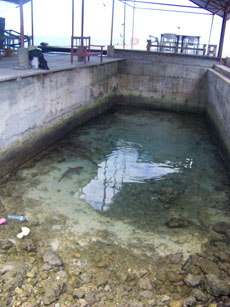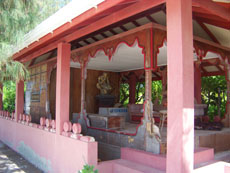In the final part of a special report from the island of Fares-Maathoda, Minivan News looks at the challenges for communities developing beyond Male’s glance as they attempt to switch to decentralised governance and overcome their natural vulnerabilities.
Sitting in Gaafu Dhaalu Atoll, the conjoined landmasses making up the island of Fares-Maathoda present an environment that has seen little of the economic and infrastructure changes witnessed in the population hubs in North Male’ atoll.
Yet like everywhere else in the Maldives, the formation of island and Atoll councils following nationwide local elections in February 2011 has raised new challenges to bring about change on a more decentralised basis.
However, some opposition politicians believe that the government was “not fully prepared” in its plans to devolve power locally, and that has caused friction between the government and local councils over what exactly their roles and responsibilities are in relation to overseeing potential changes.
For the residents of Fares-Maathoda and the five-member council elected to serve them, these changes include a proposal to use aid funds from Denmark to try and offset continued flooding resulting from drainage and waste management issues as part of wider development aims.
Ibarahim Shareef, spokesperson and deputy leader for the Dhivehi Rayyithunge Party (DRP) told Minivan News that he believed a combination of a lack of experience among elected councillors and obstruction by central government was limiting the roles of individually elected councils to oversee and deal with projects such as development.
“There is disagreement over the role of councils and what duties are being issued to them. Our country is disintegrating around us,” Shareef claimed, accepting that divisions between the present and previous leaderships of his own party had added to the partisan atmosphere of the country’s political backdrop.
“We should get all the parties including the government and opposition groups to stick together and try and resolve the differences like this issue.”
Speaking earlier this month during a visit to Fares-Maathoda, two islands that were linked together in the 1990s by reclaiming area between them – a move that exacerbated flooding problems – UN Resident Coordinator Andrew Cox said he believed that environmental and development facing the country required cooperation from all stakeholders in light of decentralised government.
“What seems to be the case at the moment is that the decentralised structures [island and Atoll councils] are developing and that’s fine. But what that means at the moment is that until things become clearer in some of the areas where we need to work, we need to stay closely connected with everybody. Yet we appreciate the need for strong coordination,” he said.
“In the end, you need the right environment if you are going to attract large-scale funding. In actual fact for the money to come to the Maldives there needs to be a favourable environment for that and even more so there needs to be a good investment environment, because that’s the way that you are going to do large-scale projects.”
Cox was on Fares-Maathoda alongside representatives from the Ministry of Finance and Treasury, the Ministry of Housing and Environment, the National Office and the United Nations Office for Project Services (UNOPS) to meet with local councillors and outline how Danish donor aid for funding climate change adaptation would be allocated on the island.
Pointing to a sea-wall development riddled with flags, displaying the yellow of the MDP on one side and the blue of the DRP on the other, Cox suggested that was a powerful reflection of the country’s partisan political functioning and the challenges it created for decentralising aid distribution.
“You have the blue on one side and the yellow on the right, which typifies the Maldives more than anything else,” he added.
However, Cox claimed that rather than acting as a test for the viability of other collaborations with recently appointed local councillors in delivering aid, Fares-Maathoda represented the need for “development best practice” and how best to try and mitigate detrimental environment and economic factors over partisan thinking.
“In the end, people involved in a project need to be involved in its decision making. That’s the bottom line, so frankly I think if you succeed, you succeed and it’s good for development and everyone who is involved can take credit,” he said. “But if you fail, it’s important to know why you failed. Then you try and reflect that back when you expand an approach outwards than you better find a way of taken advantage of that knowledge and understanding and don’t do it again.”
However, Ibarahim Shareef said he believed that in opting to decentralise power following February’s elections, President Mohamed Nasheed and his fellow MDP members had been “shocked” by the number of island councils seats that fell to opposition parties like the DRP.
Shareef claimed that he believed the government was now aiming to try and centralise power in an apparent reversal of its original intentions.
“Local people have been in a long struggle for democracy, yet some are now questioning the wisdom of supporting democratic reform,” he said. “They have not got empowerment at the level they expected.”
Shareef said that despite these uncertainties regarding the exact role of local councils, everyone involved in the process of decentralisation needed to work together to set out what powers councillors did and did not have in order to function properly.
“It is in everyone’s interests to ensure they are working properly,” he claimed.
In a bid to try and help coordinate the development projects undertaken by local councils such as those bought forward by UN aid, the President’s Office announced the formation of seven national offices back in March that it claimed were not related between some isolated disputes with local councils.
Speaking from Fares-Maathoda during the UN visit, Mohamed Shareef, Deputy Minister of State for the Upper South Province national office, claimed that government coordination remained vital to ensure all councillors are sufficiently trained to oversee development and aid in the future.
Speaking to Minivan News, Mohamed Shareef said he believed that criticism of the national offices stemmed from incorrect presumptions that the government was acting against its own decentralisation plans by giving the president more power over the country.
To try and offset these criticisms the national office has said it is offering training programmes across the country in places like Thinadoo and Addu City that aim to provide information to councillors and outline their responsibilities.
“Councillors have come from many different walks of life, but many haven’t been in administration or management, so they are very new to these procedures and understanding them,” said Shareef. “They keep saying that there are no procedures, but it is just a matter of understanding what the procedures are. So we have to keep on running training programmes. The government has a very extensive programme to try and make the councillors and the public aware of the system.”
With the councils now in place, Shareef said that these training programmes would be vital to try and ensure the success of decentralisation. However, he accepted that there was a notable difference of opinion between whether more details and information should have been given to candidates and the public before electing councillors or whether the system should be fleshed out afterwards.
Despite criticisms that more education for the public and councillors on the exact purpose of decentralisation in the Maldives should have been in place before voting began, the national office claimed that it believed the best way – as has happened – was to start the programme and learn along the way.
“I think if we had earlier tried to make people understand what [the government] were trying to do, it would have been a difficult process. On the other hand, if you have bought the system and make everyone learn by experience it might have been easier for us – it could be debated either way,” Shareef said. “We were in need of immediate change that was for sure. So we wanted a change to be implemented and it was done very quick.”
In terms of main challenges facing national offices like those in the Upper South Province, Shareef said that the cost of running five member councils across the country was definately a concern.
“We have a very poor income and the country is very small in terms of people and resources. We can discover new resources in terms of tourism but the challenge lies in the expense of bring about these changes [local councils]. It is an expensive process.”
Shareef claimed that the national councils would ultimately like to see more responsibility being taken by local councillors in dealing directly with donor agencies such as the UN over development and aid projects, while it held a light coordination role in instead.
“This would allow the direct impact [of these funds] to be felt more closely by the councils. Otherwise we should have a major role. It’s not very easy for the government agencies,” he said. “In terms of being more responsible, I think the councils can very much have a role in making the maximum use of aid coming in.”
Mohamed Shareef added that the belief of the national councils was that training projects would be at the heart of granting more development roles to local councillors in the future.
“The vision of the government is that we are going to have a very big leap in terms of development by having decentralisation. So the councils need to be very responsible and capable if they want to take up these challenges,” he said. “It all depends on how capable the councils are. In one way it’s a big relief for the government that there are councils and governors who are interested in dealing with them. For the government, it doesn’t make it very easy, but it’s the way they want to go forward I guess.”
Ultimately, Shareef said that the main plan in the long-term for each council would be to have them become more technical and development orientated rather than trying to serve a particular party political interest.
“That was the stand with which the councils came into their position, but still we have some way to go to get the councils to realise they are a technical and development body and not a political body.”
Likes (0)Dislikes
(0)Dislikes (0)
(0) 

